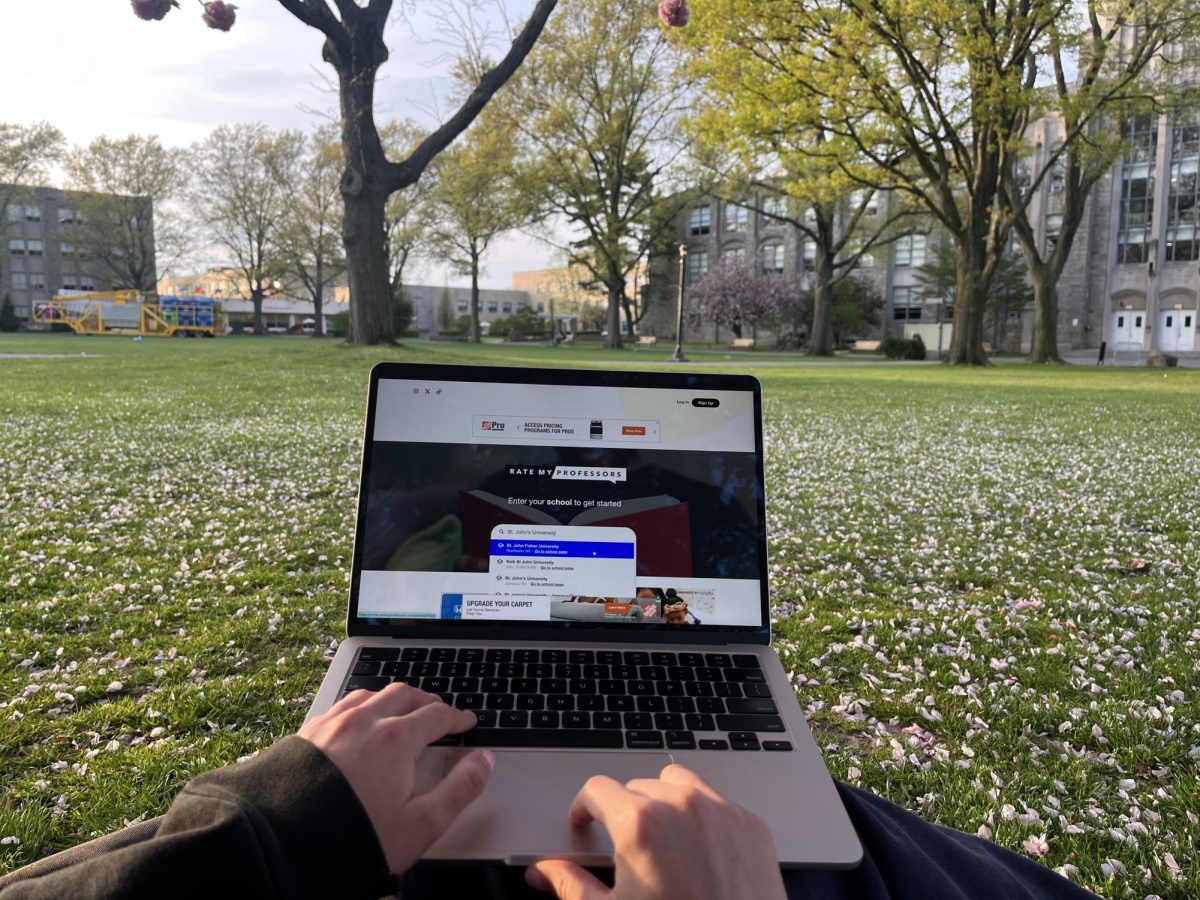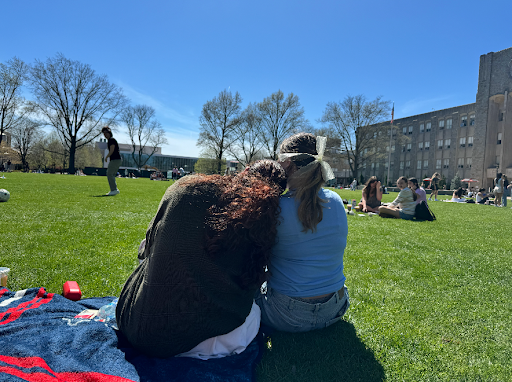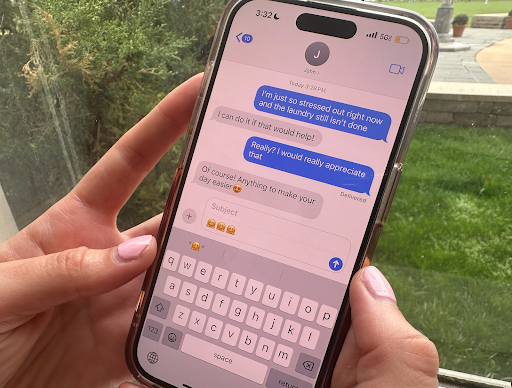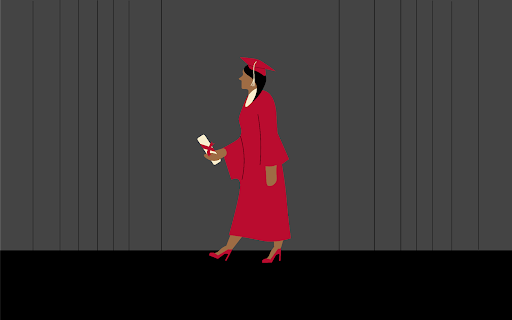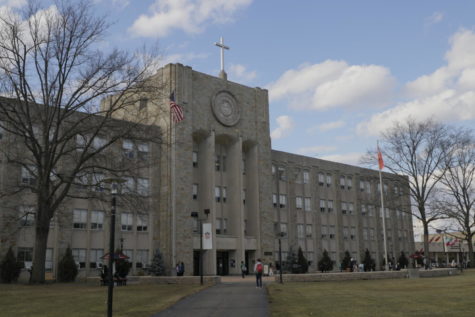
It was 11 a.m. in Rome on a Thursday morning when sophomore Calia Lee realized her weekly meeting with a Ukrainian student — which began after St. John’s University connected them, but grew into a friendship — wouldn’t be possible due to Russia’s invasion of Ukraine.
Lee’s conversations with two Ukrainian students began as part of the service requirements for the Ozanam Scholars program, a social justice and community service-based scholarship program that she’s a part of. Through the nonprofit ENGin, she helps Ukrainian students practice English through conversations about everything from politics to personal lives. While her required conversations came to an end, she has kept in touch with these two girls aged 19 and 20 through weekly meetings — though she no longer gets official credit for it.
For Lee, this war is different from any of the other conflicts she’s read about. “I have people my age who are my friends living through it, texting me their feelings as they’re going through it,” Lee said. “And I can’t say anything that’s going to make it better.”
Most St. John’s students currently studying abroad in Europe don’t have the personal connection to the situation in Ukraine that Lee has, but many are following the conflict closely. Its repercussions are impacting their time abroad in different ways.
Rebekah Sagredo is the Residence Director on the Rome campus, managing everything concerning residents on campus. Every Tuesday afternoon, she co-leads meetings for students, giving them updates and safety tips. In recent meetings, she and the other Rome staff have been strongly advising against traveling to countries bordering Russia and Ukraine.
“We suggest that students limit their traveling to Italy,” Sagredo said in an interview with The Torch. “We want students to be safe, and we may not be able to help them if they travel to places that might have spillover conflict.”
She has had a number of students ask her about altering their plans and advised them to reconsider. “All of the students that I talked to have changed their plans, sticking closer to Italy or maybe picking some other place in the western part of Europe as opposed to the eastern part of Europe.”
Sagredo is the go-to for students’ everyday questions, but there are some what-ifs that she can’t answer. Assistant Vice President Massimiliano Tomassini works in a large office situated down a long hallway of the Rome Campus. He manages all three programs in Rome, Paris and Limerick. He keeps in regular contact with the main campus back in Queens, while his teams across the European campuses report back to him. In a recent interview with The Torch, he discussed the possibility of students getting sent home.
“I don’t want to even think about it,” said Tomassini, adding that this was “only a speculation of how we see things happening if it ever came to that.”
He stressed that the number one priority was student safety. “We are working with different parties in the states and here in Italy to basically monitor the situation,” he explained. “Our concern is to show that we are always informed and will do whatever it takes to make sure our community is safe.”
He compared this situation to the pandemic, explaining that so far it is not affecting day-to-day operations in the same way that COVID-19 did. However, the process for students being sent home would likely follow a similar script to when students were sent home two years ago.
Senior English major Jack Stephenson, currently studying in Rome for a second semester, was there when students got sent home at the start of the COVID-19 pandemic.
“It was like Armageddon,” he said, recounting how quickly the university and its students had to adapt to incoming information. “It spread like wildfire. Everybody kind of panicked. This school told us for a while that we would be able to stay and that we would have the option to leave. That, within a matter of days, quickly turned into having to leave.”
Stephenson has been following the conflict closely — “almost to a fault,” he said — and doesn’t foresee the conflict escalating to a degree where students would be sent home. This being noted, he is still taking precautions. He recently rescheduled a trip that he was supposed to take with friends to Kraków, Poland, a city just a few hundred miles from the Ukrainian border.
“I just didn’t want to be in the area,” said Stephenson. “Not even just for danger’s sake but because it didn’t feel right to go and try to have a good time in the same sphere as a place that’s dealing with such a crisis.”
Liam Naughton, a junior sociology major with family living in Poland, echoed a similar sentiment. Naughton bought tickets to Krakow “weeks before anything happened” and ultimately decided to go the weekend of March 5. He was aware of the conflict but didn’t see it as risky.
“Poland is a NATO country, so I felt pretty safe there,” he said. He was expecting to see refugees, passionate protests or some other sign of a nearby conflict, but did not see anything out of the ordinary. “Life was very normal there.”
Still, he felt weird about being there on vacation two hours away from people suffering. “Guilt isn’t the right word,” he explained, but he felt acutely aware of his privileged position.
Sophomore political science major Joyce Andria was also supposed to go to Poland. She and her friends bought tickets for the week after. “I know through government classes that things change very quickly in a matter of days or even hours and just personally do not want to take that risk. So I’m not going.”
She was able to get a refund for her Airbnb, but not her flight. “This entire study abroad trip is self-funded for me, so it is a little disappointing to lose about $50; but I would rather that than get stuck there or have something not great happen while in Poland.”
While some have been a listening ear for someone experiencing the conflict firsthand, the experiences of students here abroad are varied — from rescheduled flights, minor inconveniences and general wariness. There is much uncertainty about how the conflict may unfold and what that could mean for the program, but the general tone remains hopeful.












